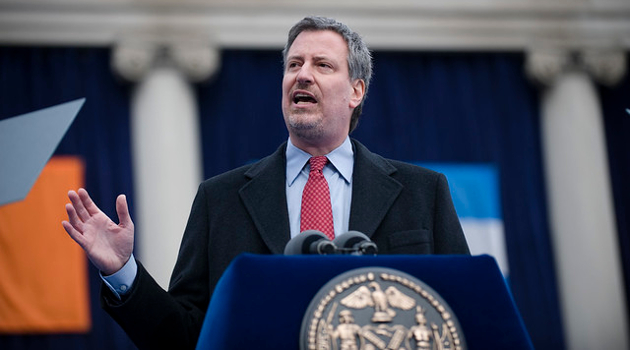Back in 2020, I warned that then-Mayor Bill de Blasio was setting the stage for fiscal crisis.
During his eight years in office, he violated fiscal policy’s golden rule by increasing the burden of government spending at three times the rate of inflation.
And all that spending requires lots of taxes, which helps to explain why residents were escaping New York City even before the pandemic.
But the pandemic accelerated the exodus, and that is turning a bad fiscal situation into a terrible fiscal situation for the new Mayor, Eric Adams.
Reporting for the New York Times, Nicole Hong and Matthew Haag write about how rich people (and their tax revenue) have been escaping New York City.
…roughly 300,000 New York City residents left during the early part of the pandemic… Now, new data from the Internal Revenue Service shows that the residents who moved to other states by the time they filed their 2019 taxes collectively reported $21 billion in total income, substantially more than those who departed in any prior year on record. …a potential loss that could have long-term effects on a city that relies heavily on its wealthiest residents to support schools, law enforcement and other public services. …The top 1 percent of earners, who make more than $804,000 a year, contributed 41 percent of the city’s personal income taxes in 2019. …The exodus to Florida was especially robust, and not just for the retiree crowd. …The pandemic accelerated the relocation of several New York-based financial firms to new offices or headquarters in Florida. …The Manhattan residents who moved to Palm Beach County had an average income of $728,351, IRS data showed.
So why are people leaving the City?
Some of it was temporary, caused by the pandemic.
But it’s very likely that most high-income emigrants won’t return. Why? Because New York City has bad governance. Everything from big problems like crummy schools to small problems like regulatory overkill.
So why pay lots of taxes when you get very little in return?
In a column last year for the New York Post, Nicole Gelinas warned about job losses in the financial industry.
…the city’s financial-industry jobs (not including real estate) were down 5 percent, to 338,800, compared with pre-COVID August 2019. Commercial-banking jobs are down 7 percent, to 67,300. Investment-related jobs are also down 7 percent, to 177,600. If we weren’t distracted by huge, double-digit percentage losses in other parts of the city’s economy, like arts and entertainment, these would be big numbers. …Some of this job destruction is a gain for other states. In Florida, financial jobs…are up 6 percent since August 2019, to 422,000. …yet another small investment firm, ARK, said it would close its New York headquarters and move…, with most of its dozens of workers going. …We used to fret about what happened when Wall Street crashed; now, we should fret that we have these woes when Wall Street hasn’t crashed.
When jobs are lost, that’s bad news for politicians because they miss out on tax revenue. And that’s true if jobs simply disappear and it’s true if the jobs move to low-tax states like Florida.
And it’s a big problem because Mayor Adams inherited a big mess. Simply stated, revenues are running away at the same time that spending is going up.
Emma Fitzsimmons wrote for the New York Times that the former Mayor’s legacy is a bloated city budget, which is connected to an ever-expanding bureaucracy.
Bill de Blasio will be remembered for many things…But one central element of his administration has received less attention: his passion for spending money. Under Mr. de Blasio, the city’s budget has soared to a record $102.8 billion, and the city work force rose to more than 325,000 employees, its highest level ever. His final budget, more than $25 billion higher than his first budget in 2014… Mr. de Blasio’s spending spree could create problems for Mr. Adams… The city work force…quickly began to rise…after Mr. de Blasio took office — pleasing the city’s municipal unions, some of which were major donors to the mayor’s political endeavors. …The increases to the city work force will create long-term costs for the city for health care, pensions and retiree benefits.
I can say “I told you so” because I warned that de Blasio was bad news when he was running for office in 2013.
Now the chickens are coming home to roost.
P.S. Just as many states compete to be the worst, the same is true for cities. Yes, New York City is a mess, but is it better or worse than places such as Chicago, Seattle, Minneapolis, Detroit, and San Francisco?
———
Image credit: Bill de Blasio | CC BY-SA 2.0.





